News from Australia, Turkey and Egypt
Tuesday's World Events — Posted on February 17, 2015
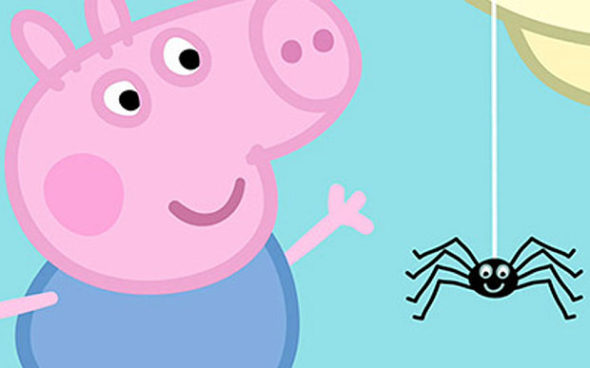
AUSTRALIA – Australian broadcaster bans cartoon episode featuring a friendly spider
Australia’s public broadcaster has banned an episode of Peppa Pig, the popular children’s cartoon, because it featured a friendly spider and sent an “unsuitable” message to children that the insects may not be dangerous. Australia has some of the world’s most deadly spiders.
The five-minute episode, called “Spider’s Web,” features an apparently innocuous spider called Mr. Skinnylegs. The family takes a great interest in the spider and learns to avoid disturbing its web.
But a viewer in Australia, which has some of the world’s most venomous spiders, complained in 2012 about the episode’s message that the insects “are not scary.”
The ABC [Australian Broadcasting Corporation] agreed that the episode sent the wrong message to children and apologized for running it.
“The ABC considered the episode unsuitable for broadcast in Australia and it had been restricted from being aired on the ABC’s television networks,” the broadcaster said in a response in August 2012. “However, the episode was accidentally published online due to a technical problem. The ABC apologized to the complainant and advised that the episode was no longer available online.”
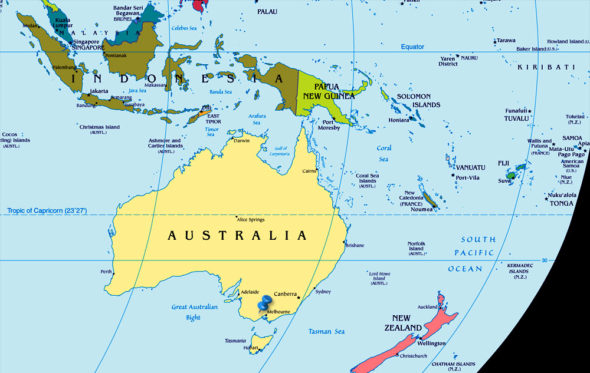
The complaint was reported in recent days by the local media, though it was not clear why the incident only emerged this week.
In the banned episode, Daddy Pig is seen repeatedly picking up the spider by a string from its web. The family learns not to disturb Mr. Skinnylegs’ web after Daddy Pig declares: “It’s hard work weaving a web … If you do, the spider has to do all the work again.”
Deaths from spiders in Australia are exceedingly rare and the creatures are less life-threatening than sharks or bees. Antivenom for most of the country’s more dangerous spiders has been available for decades.
But the current summer in Australia has reportedly seen an increase in spider-related injuries and has led to public warnings.
Last year, paramedics in Sydney attended 319 spider-related incidents in Sydney. There have already been 102 incidents recorded in 2015.
Forty-three incidents in the past fourteen months involved the funnel web, the nation’s most dangerous spider. No deaths from funnel web spiders have been recorded since an antivenom was introduced in 1981.
TURKEY – Turkey’s crackdown on freedom of speech intensifies
Turkish authorities including government agencies have stepped up their crackdown on freedom of expression online in 2014, with figures from Twitter showing the problem getting worse.
Turkey is the country which made the most requests for removal from Twitter in the last six months of 2014, according to the social network’s latest transparency report.
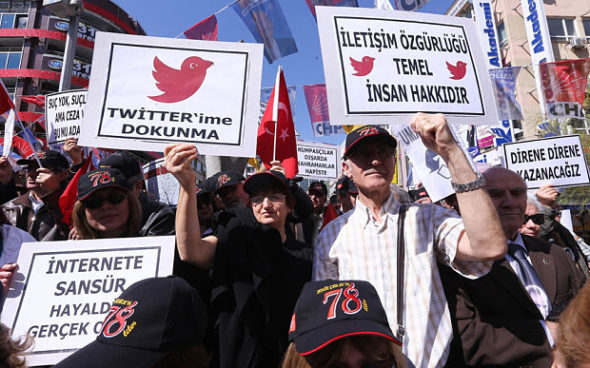
Protesters hold placards reading ‘do not touch my twitter ‘, ‘communication right is a basic human right’ and ‘cencorship to internet! A dream comes true’ during a demonstration in Ankara in March 2014. (Photo AFP)
More than 470 content removal requests were made by courts, government agencies, police and others in Turkey, and Russia came second in a list of 10 compiled below. Despite threats to freedom of expression in Russia, only 91 requests were made between July 1 and December 31.
Twitter is extremely popular in Turkey with 12 million users in a nation of nearly 75 million – the total Twitter user population is 288 million, according to the Financial Times.
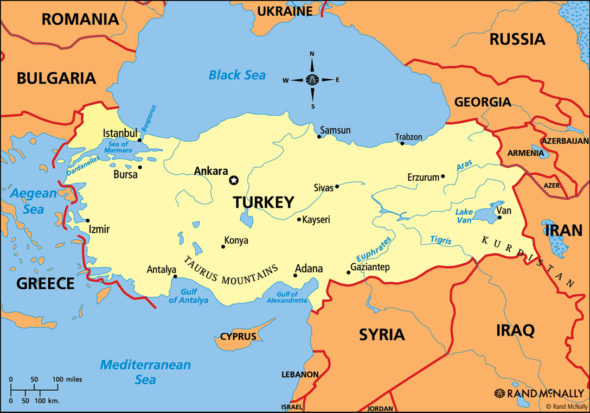
Overall, Twitter said demands by countries for content removal from the microblogging website were up by 40 per cent in the last six months of 2014.
The decision to block Twitter in March 2014 came after audio recordings allegedly revealed corruption among those close to Recep Tayyip Erdoğan, the then Turkish prime minister [who is now President]. They had been widely shared on Twitter.
It was a tense period ahead of the country’s local elections and despite the outrage and upset the ban caused, the leading [Islamist/conservative Muslim] Justice and Development Party (AKP) [Erdoğan’s party] won the majority of votes. Mr. Erdoğan became president in August.
According to Twitter’s report, the U.S. topped a list of countries’ governments requesting account information – Turkey came second with 356 requests made and in the UK, 116 requests were made.
Meanwhile, more than 90 per cent of tweets withheld after requests from authorities, courts and others, were made in Turkey. A total of 1,982 tweets were withheld, 1,820 within Turkey. …
EGYPT – Egypt hits ISIS targets in Libya with airstrikes
Egypt said on Monday it has launched airstrikes against ISIS targets in Libya after the extremist group released a grisly video showing the beheading of several Egyptian Coptic Christians it had held hostage for weeks.
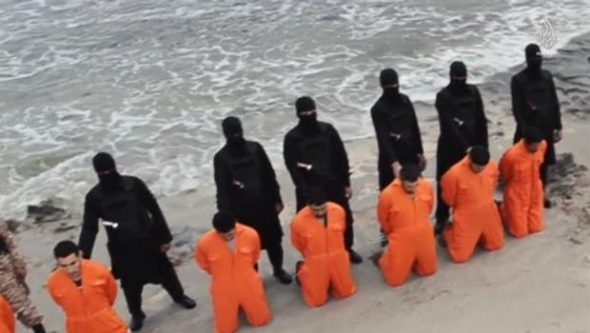
Men in orange jumpsuits purported to be Egyptian Christians held captive by ISIS kneel in front of armed men along beach said to be near Tripoli, in still image from a Feb. 15 video.
A spokesman for Egypt’s Armed Forces General Command announced the strikes on state radio Monday, marking the first time Cairo has publicly acknowledged taking military action in neighboring Libya, where extremist groups seen as a threat to both countries have taken root in recent years.
The statement said the warplanes targeted weapons caches and training camps before returning safely. It said the strikes were “to avenge the bloodshed and to seek retribution from the killers.”
“Let those far and near know that Egyptians have a shield that protects them,” it said.
Libya’s air force meanwhile announced it had launched strikes in the eastern city of Darna, which was taken over by an Islamic State affiliate last year. The announcement, on the Facebook page of the Air Force Chief of Staff, did not provide further details.
The video purporting to show the mass beheading of Coptic Christian hostages was released late Sunday by militants in Libya affiliated with ISIS. [The Egyptian government and the Coptic Church, which is based in Egypt, have said the video is authentic.]
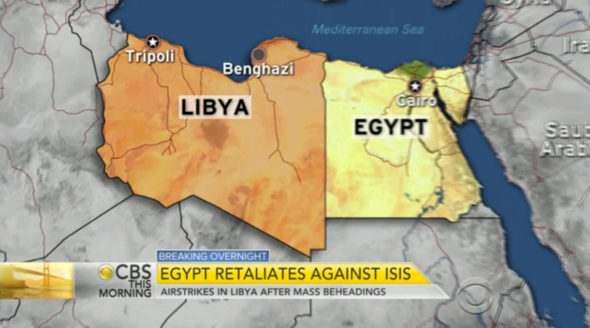
The killings raise the possibility that the extremist group – which controls about a third of Syria and Iraq in a self-declared caliphate – has established a direct affiliate less than 500 miles from the southern tip of Italy. One of the militants in the video makes direct reference to that possibility, saying the group now plans to “conquer Rome.”
The militants had been holding 21 Egyptian Coptic Christian laborers rounded up from the city of Sirte in December and January. It was not clear from the video whether all 21 hostages were killed. Pope Francis also denounced the slayings, saying the Egyptian Coptic Christians were “assassinated just for being Christian.”
It was one of the first such beheading videos from an Isil affiliate to come from outside the group’s core territory in Syria and Iraq.
Libya in recent months has seen the worst unrest since the 2011 uprising that toppled and killed longtime dictator Moammar Gadhafi, which will complicate any efforts to combat the country’s many Islamic extremist groups.
The internationally recognized government has been confined to the country’s far east since Islamist-allied militias seized the capital Tripoli last year, and Islamist politicians have reconstituted a previous government and parliament. …
(The news briefs above are from wire reports and staff reports posted at London’s Daily Telegraph on Feb. 13, Feb. 10 and Feb. 16.)
Questions
1. For each of the 3 countries, give the following information:
a) capital
b) location/the countries that share its borders:
c) the religious breakdown of the population:
d) the type of government:
e) the chief of state (and head of government if different) [If monarch or dictator, since what date has he/she ruled? – include name of heir apparent for monarch]:
f) the population:
[Find the answers at the CIA World FactBook website. For each country, answers can be found under the “Geography” “People” and “Government” headings. Go to worldatlas.com for a list of continents.]
NOTE: Before answering the questions below, read the info under “Background” and watch the videos under “Resources.”
2. For AUSTRALIA:
a) list the who, what, where and when of the news item
b) Why did a viewer complain about a children’s cartoon episode that featured a friendly spider?
c) What do you learn from this news brief about the deaths/serious injuries caused by spiders in Australia?
d) Do you think the existence of many venomous spiders in Australia justifies the viewer’s complaint? Do you think the ABC was right for banning the episode? Explain your answers.
3. For TURKEY:
a) list the who, what, where and when of the news item
b) Approximately what percent of Twitter users are from Turkey?
c) Why was Twitter blocked in Turkey in March?
d) How do you think U.S. and British requests for Twitter to block specific tweets differ from the requests of the Turkish government?
4. For EGYPT:
a) list the who, what, where and when of the news item
b) A spokesman for Egypt's military announced the airstrikes on state radio, marking the first time Cairo has publicly acknowledged taking military action in neighboring Libya. What did the Egyptian government say was the purpose of the airstrikes?
c) Do you think that the U.S. government should make such an announcement when we conduct airstrikes on ISIS? (Would you want them to?) Explain your answer.
d) Read the “Background” and watch the news video under “Resources.” Why are Egyptians living in Libya a major concern for the Egyptian government?
Background
TURKEY
- Facebook's transparency report for the first half of 2014 further illustrates the attack on freedom of expression online in Turkey. 1,893 pieces were successfully censored in Turkey and only India was higher with 4,960 pieces.
- Since the Gezi protests in the summer of 2013 and the breakdown in relations between exiled preacher Fethullah Gulen [who promotes interfaith dialogue with Jewish people] and Mr. Erdoğan, individuals' right to freedom of expression is more limited, especially for journalists.
- Sedef Kabaş, a journalist, had her home raided in December after she tweeted suggestions of a cover-up of the December 13 government corruption scandal. At the time, the sons of three cabinet ministers were arrested but the case against them and others was dropped in October 2014.
- Ms. Kabaş is now facing up to five years in jail on charges of "targeting public servants tasked with fighting against terrorism” in her tweet, Today's Zaman reported.
- Read a previous World News Brief about Prime Minister/President Erdogan:
studentnewsdaily.com/world-current-events/news-from-israel-turkey-and-great-britain - Read an editorial on Twitter's decision to comply with governments' requests to ban tweets:
businessinsider.com/twitter-censors-political-accounts-2014-5
EGYPT
- Egypt has strongly backed the internationally recognized government, and US officials have said both Egypt and the United Arab Emirates have taken part in a series of mysterious airstrikes targeting Islamist-allied forces.
- Egypt's army has posted a video of the jets taking off on their Facebook account.
- The Egyptian government declared a seven-day mourning period after the release of the video and President Abdel Fattah el-Sissi addressed the nation late Sunday night, pledging resilience in a fight against terrorism.
- "These cowardly actions will not undermine our determination" said el-Sissi, who also banned all travel to Libya by Egyptian citizens. "Egypt and the whole world are in a fierce battle with extremist groups carrying extremist ideology and sharing the same goals."
- An Egyptian government official told CBS News' Alex Ortiz that, by the Foreign Ministry's count, there are around 1.5 million Egyptian nationals currently in Libya -- a common destination for Egyptian migrant workers. The concern in Cairo is not only that things could militarily escalate between Egypt and Islamist groups in Libya, but that there are many, many Egyptian targets who could become victim to more ISIS attacks.
- The same official tells Ortiz the focus now is on evacuating those nationals -- but that's a huge number of Egyptian citizens in Libya, and it's unclear how Egypt can evacuate them in a hurry.
- The UN Security Council meanwhile "strongly condemned the heinous and cowardly apparent murder in Libya of 21 Egyptian Coptic Christians by an affiliate of the Islamic State of Iraq and the Levant. This crime once again demonstrates the brutality of ISIL, which is responsible for thousands of crimes and abuses against people from all faiths, ethnicities and nationalities, and without regard to any basic value of humanity." (from the Telegraph article and a CBS News report)
COPTIC ORTHODOX CHURCH OF ALEXANDRIA (EGYPT):
- Coptic Christians [Copts] in Egypt constitute the largest Christian community in the Middle East, as well as the largest religious minority in the region, accounting for an estimated 10% of Egyptian population.
- As a religious minority, the Copts are subject to significant discrimination in modern Egypt, and the target of attacks by militant Islamic extremist groups.
- Religious freedom in Egypt is hampered to varying degrees by discriminatory and restrictive government policies.
- Copts [and other Christians] have faced increasing marginalization after the 1952 coup d’état led by Gamal Abdel Nasser.
- Coptic Christians [known as ‘Copts’] do not see themselves as a cultural or ethnic minority but Egyptians whose ancestors embraced Christianity in the first century.
- The Coptic Christian population in Egypt is the largest Christian community in the Middle East.
- About 95% of Egypt’s Christians are members of the Coptic Orthodox Church of Alexandria, which was established in the 1st century A.D. by Saint Mark. (from another wikipedia entry)
